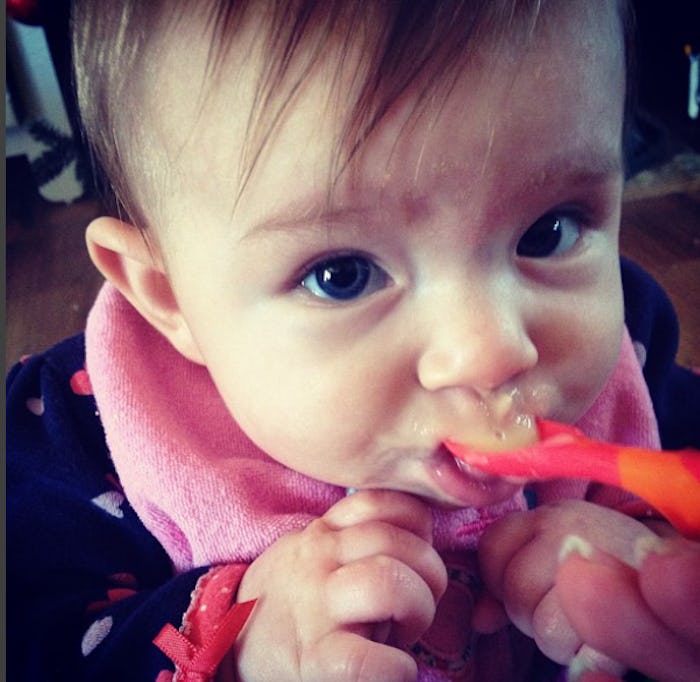Babies feel like babies until they really start chowing down on some food, don't they? I remember my daughter always felt like a baby until I was shoveling sweet potatoes in her mouth as quick as I could before she got mad. But the timeline for starting food varies depending on who you talk to, so when do babies start eating solids? At 4 months old? At 6 months old? When your breast milk is no longer satisfying their little tummies?
According to the American Academy of Pediatrics (AAP), you can start introducing solids when your child is 6 months olds. Before that time, it's recommended that your child have nothing but formula or breast milk, despite many pediatricians suggesting that a child is ready for solid foods at 4 months old. The AAP noted that many families think if a baby is fussy around 3 or 4 months old, they must be ready for food. But introducing solids before 4 months old increases the risk of weight gain and adiposity in infancy and childhood.
The World Health Organization (WHO) noted the same thing — there should be an introduction of "nutritionally-adequate and safe complementary" solids at 6 months old, but breastfeeding (or formula) should continue even after your baby starts eating solids.
International Board Certified Lactation Consultant Lisa Fortin from My Milk Matters tells Romper that there are some signs to look for when you're trying to decide if your baby is ready for solids. "Interest in food, the ability to sit unsupported, absence of the tongue thrust reflux (where your baby pushes the food out of their mouth rather than swallowing), eruption of teeth, and finally, the pincer grip," Fortin says. "You'll know your baby has experienced the latter ability when they start noticing microscopic morsels and attempt to pinch them with their thumb and forefinger. A baby who is just 6 or 7 months old can sit with the family and hold a banana, pincer grip cooked veggies and meat chunks, gnaw on a piece of toasted bread, or enjoy some fresh berries. Like breastfeeding, your baby will not overeat. Just make sure you offer healthy choices and stay away from any added sugars or too much sodium."
It's also important to remember that solids aren't replacing breast milk or formula. In terms of breastfeeding, IBCLC Lori Isenstadt of All About Breastfeeding tells Romper that you should always be offering the breast first and solids second. Your baby is still getting the majority of their nutrition from breast milk or formula, so you don't want them to get overly full on solids and not be able to continue nursing or having a bottle.
In short, 6 months old is the perfect age for solids, according to the experts. But feel free to reach out to your pediatrician for more information on when your baby is ready and how you should start feeding them solids.
